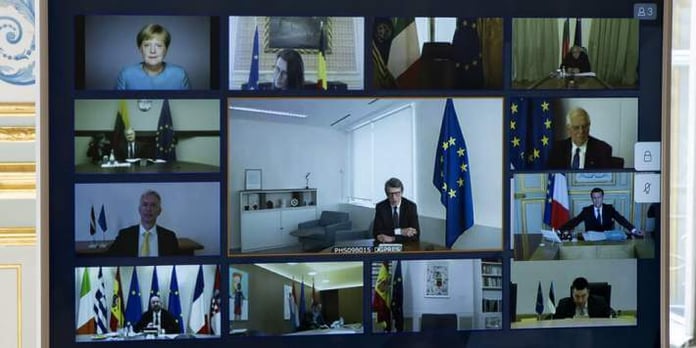
The EU has failed to develop a common strategy against the impending collapse of the economy as a result of the corona crisis. At a video summit, Italy and Spain clashed with Germany and the Netherlands on Thursday evening. The dispute sparked on the so-called corona bonds – at its core, it’s about financial solidarity.
Before the crisis summit, nine EU countries, including France and Italy, had already called for corona bonds to be introduced. These are common bonds that are issued specifically to combat the corona crisis. This would enable all countries to finance themselves cheaply in the financial markets. An assumption of old debts would explicitly not be connected with this.
However, these bonds, which are reminiscent of the controversial Eurobonds, did not appear in the draft summit decision. Instead, Merkel and Dutch Prime Minister Mark Rutte tried to block the debate on novel financial instruments. Merkel advocated offering the southern Europeans – just like in the euro crisis – loans from the ESM euro bailout fund.
However, these loans are associated with harsh, often anti-social conditions – such as privatization, labor market reforms, pension cuts. For the Italian Prime Minister Giuseppe Conte and his fellow campaigners, this is a red flag. Conte threatened not to sign the summit declaration and published a statement of her own – while Merkel & Co. were still in session.
Southerners provide ultimatum
“We have to react with innovative financial instruments,” it says. Italy and Spain would give the EU ten days to do this. It was an ultimatum that recalled the worst times of the euro crisis – and almost led to the summit bursting. In the end, the EU leaders agreed that the euro finance ministers should make their own proposals – in a fortnight.
However, the compromise no longer mentions corona bonds or other common financial instruments. The ESM is also not mentioned. It is clear that the dispute over solidarity will continue. Eurogroup leader Mario Centeno announced that he will try to find a solution in the coming week. But the prospects for an agreement are slim.
Already at the last Eurogroup meeting last Tuesday, the positions were irreconcilable. If the hanging game continues, in extreme cases there could be a new euro crisis. Because the financial markets are only lurking for an opportunity to pinch heavily indebted countries like Italy or Greece. So far, they have been protected by a European Central Bank crisis program.
The first reactions were very contradictory. Merkel ignored the dispute and praised the joint approach to the crisis. She particularly likes that the EU is now generous with state aid, which enables Germany to undertake extensive support measures for its corporations. In contrast, politicians from the SPD and the Greens criticized the Chancellor’s approach.
“Only noise and smoke” tweeted the SPD politician Bernd Lange, who heads the trade committee in the European Parliament. The EU summit only postponed the problem that it was a “dangerous tactic”. The Greens politician Rasmus Andresen expressed himself even more drastically. “It is disappointing with the arrogance with which the German federal government, together with other richer countries, plunges the EU into the crisis.” He is ashamed of the German government, said the MEP.













